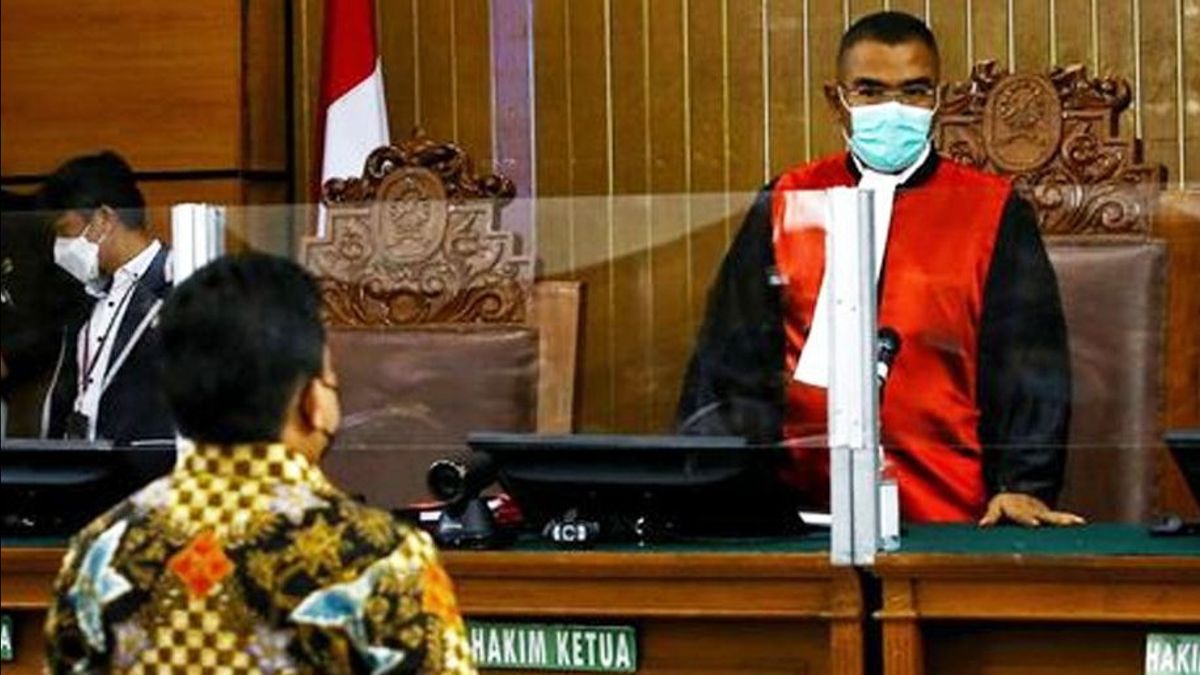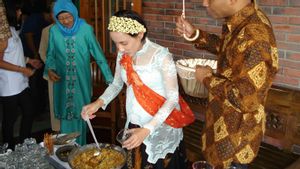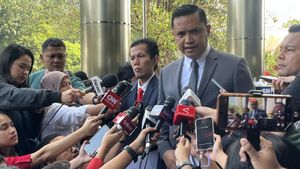JAKARTA - The follow-up trial of the murder of Brigadier Nofriansyah Yosua Hutabarat at the South Jakarta District Court on December 13, 2022, was marked by a debate between Chief Judge Wahyu Iman Santoso and the legal advisor team for the defendant Ferdy Sambo.
Judge Wahyu cut Ferdy Sambo's legal adviser while digging up testimony from witness Ricky Rizal because he felt the time given had run out.
"That's enough," said the judge.
However, legal advisors refused because they felt there were still a lot of witness statements that needed to be explored more deeply, "not yet by the assembly, there are still many."
What about Putri's legal adviser? The judge asked again.
"Yes, this assembly is digging for material truth, please take time," replied the legal adviser.
The presiding judge reiterated, "Yes, that's why I gave 45 minutes from the start. I gave 2 more questions."
The legal advisory team insisted on refusing, Don't the assembly, there are still many.
"Trus, what time do you want to reach?" asked the judge, who was then overwritten by the legal adviser, Be patient with the assembly.'
The tone of Judge Wahyu's speech began to rise. He considered the questions asked by legal advisors to repeat more.
"Yes, that's why we agreed first, from back and forth we have asked, I'm silent. We have asked what you asked but you dug again," he said.
"I have said it from the start. What has been asked is not repeated. I gave it at the beginning in 45 minutes," continued Hakim.
"I try not the assembly," replied the legal adviser.
Judge Wahyu remains firm, Two more questions! However, the legal advisor replied again, Don't be the assembly.
"What do we want to do, how long do we want?"
"A few more teams," replied the team. "Can't!" replied the judge.
Legal advisers immediately set their sights on the judge. In a high tone, he replied, "The assembly is good to have checked them before. We are only this time and given 45 minutes. We are looking for material truth or what is this assembly, our trial?"
"I confirmed the panel. We have never asked them, the panel," the legal advisor added.
"You repeat the same question that has been asked. What was asked by the witness was clear enough," Judge Wahyu reiterated the previous statement.
"For us not yet the assembly, we want to confirm again," the legal advisor replied.
The judge immediately decided, "Please submit that, but I limit the time please."
Legal advisers then continued their questions regarding the change in BAP to witness Ricky Rizal while comparing BAP Richard totaling which had changed several times.
In the previous trial of the presiding judge's leadership style, Wahyu Iman Santoso was also questioned by the legal advisory team of the defendant Strong Maruf, Irwan Irawan. Even when reported to the Judicial Commission and the Supreme Court Supervisory Body by Irwan on 7 December.
Irwan considers Judge Wahyu's statement against the witnesses in the trial to be too tendentious. Violating Article 158 of the Criminal Procedure Code (KUHAP) which states that judges are prohibited from showing their attitude or issuing statements at the trial regarding the belief regarding whether or not the defendant is wrong.
"It not only has a bad impact on his credibility, but also has a negative impact on the credibility of court institutions in Indonesia," said Irwan.
For example, Judge Wahyu's statement against Strong Ma'ruf was said to be consistent in lying.
"Then when Kodir is examined, this is all set. It means that it has concluded, it must be tested with other information. Such conclusions are in our opinion that the panel does not have the place to submit in the examination of witnesses," said Irwan when confirmed.
The Judicial Commission ensures that it will first verify the complaint. During this process, the judge concerned continued to lead the trial.
These are two separate areas. KY will verify first, whether or not the complaint can be continued. Then the examination will be carried out, if found guilty, then sanctions will be given. There are no sanctions without examination," said a spokesman for the Judicial Commission, Miko Ginting, when confirmed some time ago.
Dr. Yudi Krismen in the book 'Indonesian Criminal Justice System' applies six principles in judicial power that must be used as a guide for judges in the world, namely:
Independence is deeply inherent and must be reflected in the process of examining and making decisions on every case and is closely related to court independence as an institution that is authoritative, dignified, and reliable. The independence of judges and courts is manifested in the independence and independence of judges, both individually and as an institution of various influences that come from outside the judge.
It is a principle inherent in the essence of the function of judges as parties who are expected to provide a breakdown of each case submitted to them.
The impartiality includes a neutral attitude, maintaining the same distance as all parties related to the case, and not prioritizing any party, accompanied by an appreciation that concerns the balance between interests related to the case.
The judge's integrity is an inner attitude that reflects the needs and personality balance of each judge as a person and as a state official in carrying out his duties and positions.
The integrity of personality includes an honest, loyal, and sincere attitude in carrying out his professional duties, as well as inner resilience to ward off and reject any persuasion, temptation of position, wealth, popularity, or other temptation.
It is a norm of personal decency and decency between individuals as reflected in the behavior of each judge, both as a person and as a state official in carrying out his professional duties which creates respect, authority, and trust.
It is a principle that guarantees equal treatment of all people based on just and civilized humanity without discriminating from one another.
Diversity is reflected in the professional abilities of judges obtained from education, training, and experience in carrying out their duties. Meanwhile, togetherness is the personal attitude of the judge which describes the accuracy, prudence, accuracy, perseverance, and seriousness in the implementation of the judge's professional duties.
"The main goal of judicial power according to the constitution is to realize the ideals of the independence of the Republic of Indonesia, namely the realization of a just and prosperous Indonesian society through legal channels," said Yudi.
The English, Chinese, Japanese, Arabic, and French versions are automatically generated by the AI. So there may still be inaccuracies in translating, please always see Indonesian as our main language. (system supported by DigitalSiber.id)









